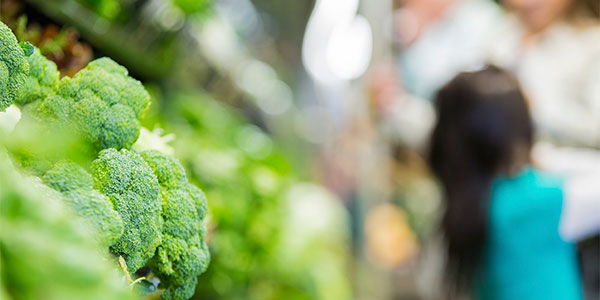Many people chose to buy organic produce and products because they have concerns about the impact conventional farming practices have on the environment. Plus they enjoy supporting local, organic farmers. But is the organic produce we purchase actually healthier than conventional produce?
Organic sales account for more than 4 percent of the nation’s total food sales, and that number is increasing, according to the United States Department of Agriculture. Research published in 2014 by the British Journal of Nutrition concluded that organic crops contain higher concentrations of antioxidants than conventionally grown foods. After reviewing 343 studies on the topic, researchers also found that conventional crops have greater concentrations of residual pesticides and toxic metal cadmium.

In organic farming, natural fertilizers are used to enrich the soil and crop rotation is used to manage weeds. Organic produce is grown without chemical fertilizers, growth hormones or synthetic pesticides, which ensures we don’t ingest any leftover chemical residue.
Rachel Freiberg, M.S., R.D., a behavioral health educator and registered dietitian with the Palo Alto Medical Foundation, says it’s difficult to pinpoint whether organic produce is any healthier than conventional produce because studies continue to go back and forth on the issue. She says the general rule of thumb is if you don’t like the idea of conventional pesticides on your food, buy organic produce whenever you’ll be eating the skin or outer layer.
“If you are on a budget, than spend your money to get the organic produce that can’t be peeled and buy conventional versions of all the others. But don’t let cost be a deterrent. It’s better to buy conventional fruits and vegetables than no fruits and vegetables at all,” Freiberg says. “If price is not an issue, then why not spend the extra money to buy organic.”
Choosing organic foods if you frequently consume a lot of produce, if you are pregnant or if you are a feeding a young, growing child is a good idea, Freiberg says. As far as purchasing organic meat and dairy products, the jury’s still out on the benefits.
“From all the research I have read, there really doesn’t seem to be a health advantage to eating organic meats and dairy over conventional. It’s best to look at your overall diet and choose lean proteins and low fat dairy products if your main concern is your personal health,” Freiberg says.
According to research by the Environmental Working Group, a nonprofit organization dedicated to protecting human health and the environment, there are certain fruits and vegetables that are best eaten if organic. These are known as “The Dirty Dozen.” These foods tested positive for a number of different pesticide residues and showed higher concentrations of the residues than other produce.
On the flipside, the group has come up with “The Clean 15,” a list of conventional produce that has the least amount of pesticide residues in low concentrations.










